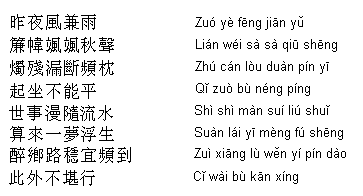deutsche Version
Sascha Lino Lemke (*1976)
"...Qi zuò bù néng píng"

Music for Soprano, 14 instrumentalists & electronics
with a poem by Li Yu
dedicated to Fabrice Pierre
Auftragswerk von Opus XXI
Dauer: ca. 12 min.
Die Komposition ist inspiriert von einem klassischen chinesischen Gedicht von Li Yu (937-978).

Last night the wind and rain together blew,
The wall-curtains rustled in their autumn song.
The candle died, the water-clock was exhausted,
I rose and sat, but could not be at peace.
Man's affairs are like the flow of floodwater,
A life is just like floating in a dream.
I should more often go drunken through the country,
For otherwise I could not bear to live.
Auch wenn sich gewisse Korrespondenzen zwischen der Gro§form und dem Inhalt des Gedichtes finden lassen, sind es aber v.a. klangliche Aspekte des Gedichtes, die sich in der Musik spiegeln.
Das Gedicht hat Jing Zhao für mich eingesprochen, der ich herzlichst für ihre Hilfe danke. Ausgehend von dieser Aufnahme habe ich die melodischen Konturen mit ihren Glissandi sowie die Sprachrhythmen der einzelnen Zeilen trasnkribiert. Dieses Material ist Ausgangspunkt der Komposition geworden.
Das Material ist auf sehr verschiedene Weisen verarbeitet worden. Es gibt die unveränderte Wiedergabe einzelner Zeilen in Kombination mit Orchestrierungen derselben, die die Konturen nachziehen und schärfen. Bisweilen sind mysteriöse rhythmische Botschaften eingewebt, die sich als Sprachrhythmen entpuppen. An zwei Stellen wird eine extrem verlangsamte Version als pulsierende Akkorde des Ensembles wiedergegeben, die aus einer FFT-Analyse der Aufnahme stammen.
version française
Sascha Lino Lemke (*1976)
"...Qi zuò bù néng píng"

Musique pour soprano, 14 instrumentistes & électronique
avec un poème de Li Yu
dédié à Fabrice Pierre
commande d' Opus XXI
durée: 12 min.
La pièce s'inspire d'un poème chinois classique de Li Yu (937-978).

La nuit dernière le vent et la pluie soufflaient ensemble,
les tapisseries murales bruissent en leur chanson d'automne.
La chandelle expire, la clepsydre était épuisée,
je me levait et me rassoyais, mais ne pouvait être calme.
Les affaires des hommes sont comme l'écoulement du flot,
une vie est comme coulisser sur une rêve.
Je devrais marcher dans la campagne plus souvent étant ivre,
parce qu'autrement, je n'oserait pas de vivre.
Même si on pourrait trouver certaines correspondances entre le contenu du poème et la grande forme de la pièce, la relation est surtout basé sur des aspects sonores du poème.
Je l'ai enrégistré avec Jing Zhao qui je remercié beaucoup pour son aide. A partir de cet enrégistrement, j'ai transcrit les contours mélodiques avec ses glissandi et les rhythmes des lignes du poème. Ce matériau est devenue le point de départ de la composition.
Ce matériau est utilisé de plusieurs manières très differentes. Soit qu'on entend l'enrégistrement original avec une orchestration de la voix parlée. Soit qu'on perçoit des rhythmes mysterieux extraits du poèmes. Soit que l'ensemble joue des pulsations d'accords représentant une version extrèment ralentie du poème issue d'une analyse FFT de la voix parlé.
english version
Sascha Lino Lemke (*1976)
"...Qi zuò bù néng píng"

Music for Soprano, 14 instrumentalists & electronics
with a poem by Li Yu
dedicated to Fabrice Pierre
commissoned by Opus XXI
duration: approx. 12 min.
One important source of inspiration for this piece was the following poem by Li Yu (937-978).

Last night the wind and rain together blew,
The wall-curtains rustled in their autumn song.
The candle died, the water-clock was exhausted,
I rose and sat, but could not be at peace.
Man's affairs are like the flow of floodwater,
A life is just like floating in a dream.
I should more often go drunken through the country,
For otherwise I could not bear to live.
Even even if there are some influences of the content of the poem to be found in the form of the piece, the main importance of the text for the music lies in sonic aspects of the chinese language.
I warmly thank Jing Zhao for recording the poem for me. This recording became not only the main material for the electronic part, it also was analysed and used for certain compositional processes whilst writing the instrumental part. The rhythm of the speech, the melodical contour served as material. And parts of an FFT analysis have been orchestrated in a very slow tempo in order to combine this orchestrated version with the original played by the computer during the concert.